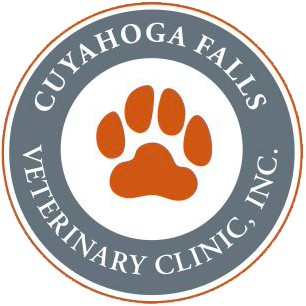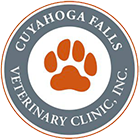I recently had the opportunity to talk with Jeff Marginean, author and host of My Buddy Butch, about the recent survey by Pfizer Animal Health’s Veterinarians Against Canine Obesity and some of the important points associated with identifying, treating and managing the disease of obesity. The interview will air on July 21 & 22 on the MBB Radio Network, and then it’ll be archived on the MBBRadio page.

Because radio (and television) is limited by time, I wanted to take the opportunity here on our blog to elaborate a bit on some of the findings in the survey and also point to some information that will expand on the subject.
First of all, the survey found that 50% of Akron-area dog owners report being more than their recommended weight range, with more than one-fifth being overweight or obese. Of the owners who self-reported that their dogs were overweight or obese, the stated number was a mean of 10 pounds more than their dog’s ideal weight.
20% of respondents reported giving their dogs mild exercise once a week or less.
When it comes to feeding their dogs, 26% estimate on their own how much their dog needs to eat, and 17% fill the bowl whenever it is empty.
Similarly, 20% feed their dogs table scraps daily and 17% give their dogs treats three or more times per day.
I suppose it is encouraging that 79% of the survey participants visit their veterinarian regularly for shots and checkups (it could be worse), but it is discouraging that 2 out of 2 respondents reported talking about their dog’s feeding habits, less than half talk about how they exercise their dog, and barely 4 in 10 talk about weight concerns with their vet. There is no more appropriate time to talk about these things than at the visit with the veterinarian. These numbers should be close to (if not) 100%!
The survey did suggest that owners know that their dog’s obesity is associated with shortened life expectancy (76%), heart or cardiac conditions (69%) and breathing problems (64%). But it also revealed that many do not know that other health conditions that can result from their dog being overweight or obese – including skin conditions and arthritis.
Finally, from the “Interesting Findings” file, the survey showed almost half (48%) of dog owners in the Akron area indicate they do not think any differently about owners of overweight or obese dogs, 39% report they think the owners are irresponsible and 10% think they are lazy. So in addition to there being serious health concerns associated with canine obesity, there are also concerns of social judgement!
I’ll say it once again, because the point cannot be overemphasized: obesity is a disease that has serious consequences. According to a fourteen-year study conducted by Purina (who would love to see a result that said, “FEED MORE PURINA!” the difference in life span between an obese dog and a healthy weight dog is nearly two years. The results stressed the importance of restricting calories!
Additionally, we know that exercise is an important component of managing a dog’s body condition. Instituting calorie control and exercise, particularly for overweight/obese dogs, involves a change in the pet’s and owner’s lifestyle.
One of my jobs as a veterinarian is to educate dog owners about the importance of maintaining a healthy weight for their dogs. A very important message I want to get across it that it’s not necessarily the dog owner’s fault when their overweight/obese dog isn’t responding well to a diet/exercise plan. While diet and exercise are key contributors to the obesity problem, there are often other factors that are beyond the dog owner’s control. When dogs become obese, changes in physiology and hormone balance occur that make it harder for the dogs to lose weight; changes in the dog’s body can lower their metabolism, increase their appetite and even cause or worsen other serious medical conditions. This is why it’s so important to meet with your vet if you are having concerns about your dog’s weight.
If you’re in the northeast Ohio area, and you either don’t have a veterinarian that you regularly visit, or if you’re frustrated with the options that you’ve been given for your overweight/obese dog and you’re looking for a positive change, give us a call at 330-929-3223 and set up a time to meet with one of our doctors.

